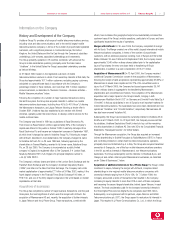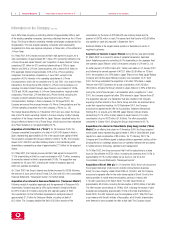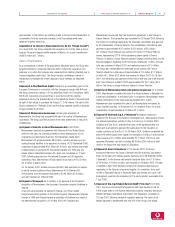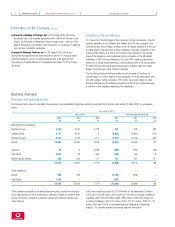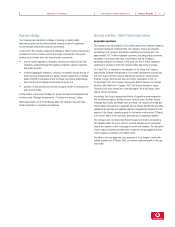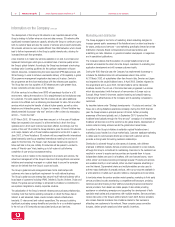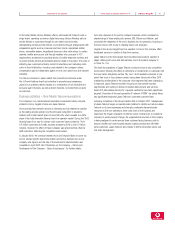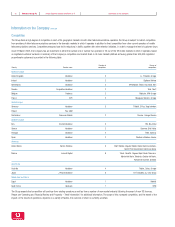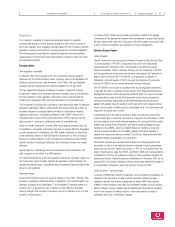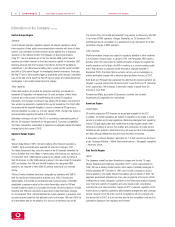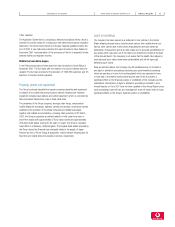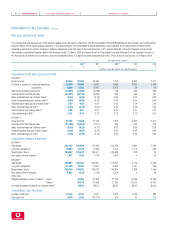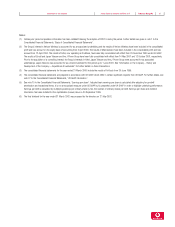Vodafone 2002 Annual Report Download - page 19
Download and view the complete annual report
Please find page 19 of the 2002 Vodafone annual report below. You can navigate through the pages in the report by either clicking on the pages listed below, or by using the keyword search tool below to find specific information within the annual report.
Information on the Company Vodafone Group Plc 17Annual Report & Accounts and Form 20-F
Columbia found that the FCC incorrectly re-auctioned 1.9 GHz licences to Verizon
Wireless, amongst others, in June 2001.
Following the failure of the US Congress to ratify a settlement agreed between
the FCC and NextWave, which would have allowed the re-auction winners to
keep the licences, the US Supreme Court has agreed to hear the FCC’s appeal of
the US Court of Appeals ruling.
In the interim, the FCC has returned 85% (approximately $1.5 billion) of the
auction deposit that Verizon Wireless paid to the FCC. The FCC has kept part of
the funds on the assumption that, had the re-auction carriers withdrawn from the
auction, a penalty would normally be due. The FCC has stated that the re-auction
“winners”are liable for their winning bids if the FCC wins its case at the
Supreme Court. If the FCC is successful, the FCC contends that Verizon Wireless
will be liable for the entire $8.7 billion bid. However, this matter is being disputed
by Verizon Wireless.
In February 2002, Verizon Wireless announced plans to move to a more
streamlined organisational structure including a reduction in the number of its
employees.
Mexico
On 4 April 2001, the Group acquired a 34.5% interest in Grupo Iusacell. Grupo
Iusacell currently provides wireless services in seven of Mexico’s nine regions,
covering a population of 90 million people and representing approximately 90%
of the country’s total population. Roaming is provided in the two remaining
regions. At 31 March 2002, market penetration in Mexico was 22%.
Mexico’s cellular market has continued to expand, with customer growth largely
driven by prepaid products. At 31 March 2002, Grupo Iusacell had 1,995,000
registered customers, an increase of almost 13% since the date of acquisition.
Of the total registered customer base, 81% were prepaid customers.
Globalstar
During the year the Group restructured its Globalstar service provider operations
in North America. As part of an arrangement with Globalstar LP, the Group
entered into an agreement for the sale of a portion of the Group’s equity stake in
Globalstar LP and its Globalstar service provider businesses in the US, Canada,
the Caribbean and miscellaneous undeveloped territories for a nominal
consideration. The finalisation of the sale of the US and the Caribbean
businesses is awaiting appropriate regulatory approvals.
Asia Pacific
The Group’s interests in the Asia Pacific region comprise subsidiary undertakings
in Australia, Japan and New Zealand, associated undertakings in Fiji and India,
and the Group’s interests in China.
During the 2002 financial year, the Group undertook a number of transactions
that significantly increased its ownership interests in its Japanese operations.
These are described in “Information on the Company – History and Development
of the Company – Acquisitions of businesses”.
Below is a description of the business developments and activities of the Group’s
business activities in the major telecommunications markets in Asia Pacific.
Japan
At 31 March 2002, J-Phone Vodafone had approximately 12,185,000 registered
customers and a market share of almost 18%.
Japan’s mobile telecommunications market remained robust as mobile services
continued to expand. The number of mobile phone users increased by
8,177,000 or 13%, year-on-year to 69,121,000 at 31 March 2002 and market
penetration was 54%, compared to 48% at 31 March 2001.
J-Phone Vodafone continued to capture market share, with 2,219,000 net
customer additions recorded in the year ended 31 March 2002, resulting in
J-Phone Vodafone becoming the second largest operator in Japan at 31 March
2002. One of the key drivers of this recent growth has been the success of
J-Phone Vodafone’s “sha-mail”, the popular photo-messaging service for
customers with camera-enabled handsets. To ensure such growth continues,
further enhancements have been made recently, in particular the launch of the
video clip message service “movie sha-mail”. Customers using sha-mail now
account for one-third of J-Phone Vodafone’s total customer base. The sha-mail
service is part of a sophisticated mobile interactive service, J-Sky. At 31 March
2002, 82% of J-Phone Vodafone’s customer base subscribed to the J-Sky
service.
On 30 June 2000, the Ministry of Post and Telecommunications awarded one of
three 3G licences to J-Phone Communications. No licence fees were required by
the Japanese government. J-Phone Vodafone is expected to be the first network
operator in the Group to open its 3G network for service, and amongst the first to
fully launch services with nationwide service expected to commence in
December 2002. J-Phone Vodafone’s 3G network will be compatible with
international global standards, giving Japanese customers unparalleled access to
similar international networks. As a precursor to opening the 3G network for
service, J-Phone Vodafone commercially launched a 2.5G service in March
2002, acquiring 115,000 customers in its first month.
China
Following the signing of a memorandum of understanding between the Company
and China Mobile in October 2000, the Group acquired newly issued shares
representing approximately 2.18% of China Mobile’s share capital for a cash
consideration of $2.5 billion in an offering that closed on 3 November 2000.
The two companies also signed a strategic alliance agreement on 27 February
2001. At that time the Company and China Mobile also stated their intention to
explore opportunities for joint ventures and other equity-based strategic alliances
in areas such as research and development of mobile data services, international
investment opportunities and regional and/or global alliances.
In January 2002, the Group made a $35 million investment to acquire a 9.99%
interest in Aspire Holdings, China Mobile’s subsidiary set up to develop its mobile
internet service delivery platform and take responsibility for mobile data research
and development. On 16 May 2002, the Group announced that it will be
subscribing to a share issue by China Mobile for $750 million, increasing its
effective interest to approximately 3.27%. Also, China Mobile has announced its
intention to commence the payment of dividends starting in the financial year
ended 31 December 2002. The Company may also appoint a non-executive director


